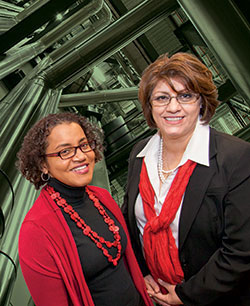
and Nasrin Khalili [right]
Photo: Michael Goss
Green manufacturing is a hot topic worldwide and researchers have made significant strides in developing efficient production techniques. Yet the implementation of these advances has come in fits and starts, particularly among small and mid-size companies, and in economically developing regions such as Central America. Two Illinois Institute of Technology researchers are endeavoring to bridge the gap between university-level theory and common manufacturing practice with the help of a U.S. State Department-supported research project, Pathways to Cleaner Production in the Americas.
IIT Stuart School of Business faculty members Weslynne Ashton and Nasrin Khalili (Ph.D. ENVE ’92) are collaborating with colleagues from five other universities on the three-year project, which is backed by more than $1 million in funding. The partner universities include schools in Costa Rica, El Salvador, Guatemala, Honduras, Nicaragua, Peru, and the Dominican Republic, as well as New York Institute of Technology. During the initiative’s first 18 months, Ashton and Khalili focused on building relationships and sharing concepts among faculty at the participating universities. There were faculty training workshops in Costa Rica, El Salvador, and the Dominican Republic and a student-focused workshop in Peru. A conference in Chicago last August attracted attendees from nine partner organizations such as the Washington, D.C.-based World Environment Center, in addition to faculty from the six partner universities.
“It’s been very rewarding to learn about the issues that these faculty partners face,” Ashton says, “and then work together to address them.” Her Latin American colleagues agree.
“It has been a great benefit to exchange our experiences, best practices, lessons learned, and obstacles to implementation,” says Rosaura Pimentel Francisco, a member of the engineering faculty at Technological Institute of Santo Domingo, a partner institution located in the Dominican Republic.
“We’d like our work to have a real-world impact, and that’s what this is.” −Nasrin Khalili
Now Ashton, Khalili, and the team are turning their focus to research. Ashton’s work looks at how market-based incentives and access to capital might spur smaller enterprises to adopt cleaner production practices. Khalili’s research is concentrated on faculty and curriculum development, more specifically on the design of cleaner production educational models that can bring about the human capital needed to support sustainable development. Colleagues at partner institutions are leading two other research projects, one focused on the coffee industry and the other looking at whether experiential cleaner production learning opportunities benefit students when they hit the job market.
“These are pilot projects to identify problems and opportunities. The biggest contributions I hope we can make are to identify our core concepts as legitimate and to understand how to customize our strategy according to the context of each country,” says Khalili.
The team’s first research paper, which has been accepted for publication in the Journal of Cleaner Production, looks at two ways universities in Latin America can improve how they promote cleaner production. “We can’t just be working on the theory [of clean production]. It’s about actually getting the experience of going out to a factory, talking to the owner and the employees, and understanding the issues they’re dealing with that might make it difficult to implement these theoretical recommendations,” Ashton says. “That’s an experience that most of our university partners have not had.”
As part of that initiative, Ashton is making connections among Latin American universities and the administrators of nearby National Cleaner Production Centres in order to facilitate more direct engagement with industry. (NCPCs are United Nations-supported clean-production training and advocacy groups.)
Thanks to the project, students are learning “the real situation of enterprises,” says Yolanda Salazar de Tobar, executive director of the National Cleaner Production Centre in El Salvador, who believes that over the long haul the project will “increase awareness among students that environmental investment is profitable, and as they find opportunities to improve processes they will be change agents in Salvadoran industry.”
That promise of affecting meaningful change drives Khalili and Ashton as well.
“We’d like our work to have a real-world impact, and that’s what this is,” says Khalili. “Our experience, knowledge, and training are paying off by taking this to the next level.”
More Online
Pathways to Cleaner Production in the Americas: www.cleanerproduction-la.org